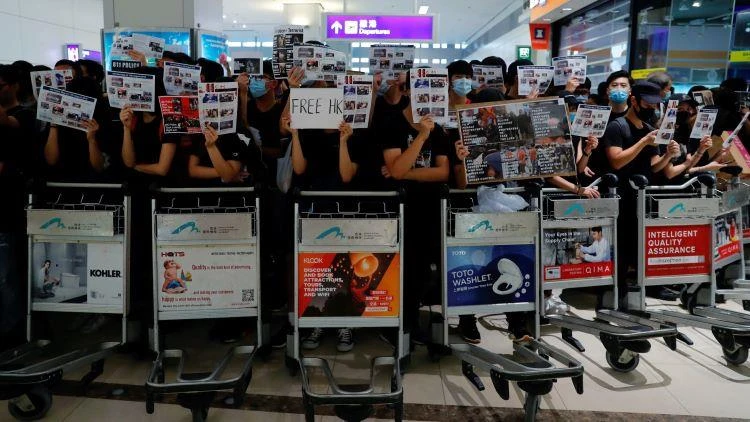
New data released Friday underscored how Hong Kong's continuing anti-government protests are affecting the city's tourism, hotel and retail sectors, adding to expectations that the economy is entering a recession.
The gloomiest figures emerged from retailers. Their total sales for July declined 11.4% from a year earlier to $34.4 billion, according to the Hong Kong Census and Statistics Department, expanding on a 6.7% drop in June.
"The business decline is more severe in August than July," said Annie Yau Tse, chairwoman of both the Hong Kong Retail Management Association and of the Tse Sui Luen Jewellery (International) chain, on Friday.
With tourist-focused retailers now seeing their sales cut in half, she said some are asking staff to take unpaid leave. She said landlords had so far largely ignored the association's call for a 50% break on the city's notoriously high rents for six months.
"Layoffs will be unavoidable if the protests persist for longer," she said.
The government this month trimmed its annual forecast for economic growth to a range of flat to 1% from 2% to 3% earlier and reported that output contracted 0.4% in the April-June quarter from the previous quarter. Given the gloom, many economists say the July-September quarter will be even worse. A second consecutive quarterly drop would technically mark the city's entry into recession.
Hong Kong ranked as the world's most visited city last year, according to research company Euromonitor, with 29.8 million international visitors.
"The protests have exacerbated a difficult economic situation," Kim Eng Tan, senior director for sovereign ratings at S&P Global Ratings, said in a research note on Friday. "Already weighed down by U.S.-China trade tensions and a slowing global economy, the (Hong Kong) SAR now has to contend with a sharp drop in inbound travel and weaker domestic consumer demand... The government could run its first consolidated deficit since fiscal 2003."
Government officials have strained to offer the message abroad that violent clashes between police and protesters affect limited areas of town, reiterating, "Hong Kong remains a welcoming city for tourists and investors, a safe place for travelers from around the world." Yet more than 30 foreign governments have issued advisories to their citizens warning of potential dangers.
Monthly visitor arrivals declined in July for the first time this year, dropping 4.8% from a year earlier to 5.2 million. Arrivals from mainland China, the city's top visitor market, accounted for more than 90% of the decline. Hong Kong Commerce Minister Edward Yau said last week that arrivals for the Aug. 15-20 period halved from a year earlier after dropping 30% for the first 10 days of the month.
Some mainlanders have been put off by the unrest, which has sometimes been directed at symbols of official Chinese authority. According to some local news reports, regional officials in China have also tightened issuance of permits to visit Hong Kong in recent weeks, in part to shield their constituents from the sight of citizens standing up to authority.

But in the eyes of economists at fund management company Northern Trust, there are other factors involved. "Investment and tourism from the mainland have been discouraged," they wrote on Monday. "Beijing is hoping economic pressure will be sufficient to quell the uprising."
Retailers focusing on tourist traffic have been the most affected by the decline. By the government's count, sales for the category of jewelry, watches and valuable gifts fell 24.4% in July from a year earlier.
Jeweler Tiffany & Co. on Wednesday cited the protests in Hong Kong, the company's fourth-largest market, as a key factor in a 1% decline in Asia-Pacific sales for the April-June quarter from the year before.
"There's a lot of folks (in Hong Kong) focused on various matters and shopping may not be their primary concern," Chief Financial Officer Mark Erceg told analysts. Added CEO Alessandro Bogliolo: "We must acknowledge that the current situation is taking a toll on our business. We estimate that during the second quarter, we lost nearly six full selling days due to unplanned store closures."
Hotels are under pressure, too. Average occupancy rates declined 5 percentage points from a year earlier to 86% in July, according to the Hong Kong Tourism Board. Average actual room rates fell 7.6% to 1,114 Hong Kong dollars ($142) a night. Several hotel companies have reportedly asked staff to take unpaid leave.
Cathay Pacific Airways, Hong Kong's dominant carrier, reported Aug. 21 that while its overall passenger traffic grew in July, routes involving mainland China experienced a 2.8% decline from a year before. Under pressure from Chinese officials and internet users to take a hard line against staff supporting the protests, the airline replaced its chief executive the previous week.
Ronald Lam, who took over as chief customer and commercial officer after his predecessor also resigned, said that the airline was experiencing a "significant impact" on its August revenue. "Traffic into Hong Kong, both business and leisure, has weakened substantially."
Some airlines have begun reducing service to Hong Kong, particularly after protesters brought the city's airport to a virtual halt for two days in mid-August. United Airlines said this week that it would halt its daily flights from its Chicago hub while Qantas Airways is switching to smaller aircraft for its routes from Australia.
Tourists aren't the only problem for companies in Hong Kong. As Cathay's Lam said, "We have also now seen ex-Hong Kong traffic starting to soften."
The shakier economic outlook is affecting local consumer confidence, but there are also signs of deliberate targeting of companies, such as Cathay, seen as siding too much with Beijing.
Said A2 Global Risk, a business advisory company: "There is also a growing threat to businesses perceived as pro-Beijing or unsupportive of protester demands. These businesses may be targets for vandalism, staff, social media and online intimidation, as well as calls for consumer boycotts."




















